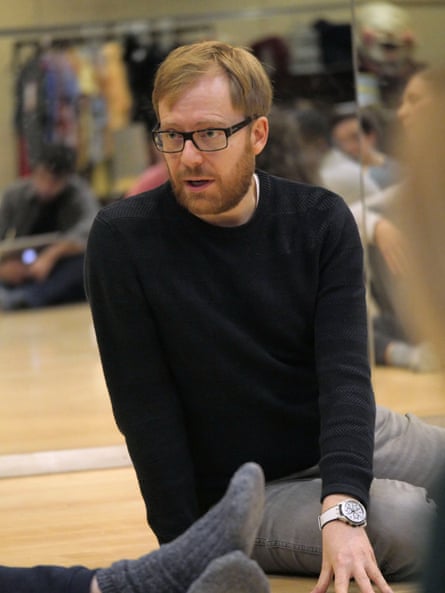Nearly 50 years after Peter Brook’s legendary white-box staging, A Midsummer Night’s Dream is still seen as a summery staple. Since the director reframed its fairy kingdom as a realm of the subconscious, driven by erotic desire, sexed-up fairies have become the norm. Cabaret artist Meow Meow played Titania at the Globe last year, with Oberon as a depressive drinker and Puck a rampant imp. Emma Rice’s production was a thoroughbred crowdpleaser nonetheless.
Joe Hill-Gibbins is a different sort of director. His Measure for Measure, starring Romola Garai, played out on a heap of inflatable sex dolls. He chucked a furious food fight into revenge tragedy The Changeling and reflected on the 2011 riots in Alecky Blythe’s Little Revolution. So the idea of his Midsummer Night’s Dream is tantalising. Even the posters are intriguing: portraits blocked out by landscapes, photographs of forests where faces should be.
Not a fluffy romcom then? “It’s really quite a deep and dark play about how difficult it is to sustain relationships, and the way people manipulate and hurt each other, even torture each other, intentionally or otherwise,” he says. “It’s a really complex play.” A lot gets taken for granted in A Midsummer Night’s Dream. “Did Shakespeare believe in fairies?” Hill-Gibbins wonders aloud. “I’m not sure he did. I don’t know, but I’m not sure he was writing a play about our fairy friends. So what are fairies, then?” He continues: “You’re in the forest at night and you hear a strange noise. Is that a fox having sex or a baby screaming as it is dragged away? Fairies are a product of our imaginations, something we project into the dark.”

He goes back to the changeling myth: fairy children left in the place of afflicted newborns who have been taken into the woods by their parents. “Fairies are stories we tell ourselves about things we can’t deal with or take responsibility for,” he says. Four lovers go into the woods and swap partners? Blame the fairies. “To say, well, fairies aren’t real? To me, that isn’t enough.”
Hill-Gibbins sees the whole play as a study of what’s real and what’s not: fairies, feelings, theatre. He alludes to two plays within Shakespeare’s plays: the Mousetrap in Hamlet and Pyramus and Thisbe in the Dream. “Both are concerned with the idea that theatre can be incredibly real – so real that it’s dangerous.” If the former can catch a king, the latter could kill the players. The Mechanicals panic about the power of their play: that the lion might frighten the ladies, that people might think Pyramus has pegged it for real. “It’s full of anxieties about that,” Hill-Gibbins says. “I reckon they’re on to something. Theatre is potentially dangerous.”
It certainly is when he’s at the helm, but he can be a hard director to pin down. Hill-Gibbins doesn’t impose a signature style on plays, but nor is he the sort of director to disappear by serving the text first and foremost. He’s more unpredictable than all that. You can always feel a director’s hand at work in his shows, but you can’t always identify his fingerprints.

Even the plays he puts on are an eclectic lot. Tennessee Williams sits next to Thomas Middleton, Blythe alongside Brecht, Martin McDonagh with Penelope Skinner, some Shakespeare for good measure. Look closer and there is a common thread. Hill-Gibbins is a champion of the romantically challenged. He collects bruised hearts and lovesick souls; his shows seethe with petty jealousies, rejection and lusts that have nowhere to go. It’s what links The Glass Menagerie’s Laura Wingfield, mooning over her gentleman caller, with Maureen Folan, the beauty queen of Leenane. It connects The Changeling’s pockmarked De Flores with Measure for Measure’s lascivious Angelo.
Most directors stage love stories in search of something else. They use Romeo and Juliet to talk about youth or they examine exile through As You Like It. It’s as if they take love itself for granted. Hill-Gibbins, by contrast, heads straight for the heart. “It’s definitely one of the things I’m most interested in.” Is there a reason for that? “Yeah, maybe,” he mulls. “Maybe.” A long silence. “You’re drawn to what you’re drawn to. I think it’s a fascinating subject.”
And he treats it as such, not simply as a style. Sentiment never gets a look in. His isn’t a picture-perfect, happy ending sort of love. It’s hot and raw and heartless. It’s desirous, possessive, unfair. This is how Hill-Gibbins likes his theatre, full of “very powerful contradictions”. He’s not one for illustrative, issue-led art. “I might want to hear about it in life, but I don’t want to see it on stage,” he says. “Really good plays and really great performances pull you into a space where your rational mind is transcended or destabilised. It goes back to the Greeks and Dionysus. I’m not saying there’s no place for thought in theatre, but don’t you want to get out of your head?”
- A Midsummer Night’s Dream is at the Young Vic, London, 16 February-1 April. Box office: 020-7922 2922.

Comments (…)
Sign in or create your Guardian account to join the discussion